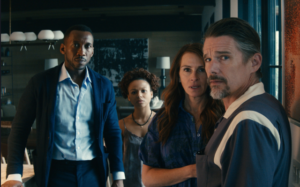LEAVE THE WORLD BEHIND: 3 ½ STARS. “an elegant post-apocalyptic film.”
 “Leave the World Behind,” a new end of the world drama starring Julia Roberts, Ethan Hawke, Mahershala Ali and Myha’la, now streaming on Netflix, is a strange tale of how people become friends in trying times and the power of the sitcom “Friends.”
“Leave the World Behind,” a new end of the world drama starring Julia Roberts, Ethan Hawke, Mahershala Ali and Myha’la, now streaming on Netflix, is a strange tale of how people become friends in trying times and the power of the sitcom “Friends.”
Based on the 2020 novel by Rumaan Alam, the movie sees Julia Roberts and Ethan Hawke as A-type Amanda and go-with-the-flow Clay, New Yorkers and parents to teenagers Rose (Farrah Mackenzie) and Archie (Charlie Evans). On a whim Amanda rents a luxury weekend retreat in Long Island, to get away from the stresses of the city.
“I figured if I made the reservation and packed our bags,” Amanda says, “it would eliminate most of the reasons to say no.”
They arrive to find a beautiful modernist home waiting for them, complete with interesting art, a lavish gift basket and an inviting pool in the backyard. It’s a paradise, although Rose, who has been binging “Friends” online, is annoyed that the spotty wi fi is preventing her from watching the last episode of the series. But that’s nothing that some fresh air and a dip in the pool can’t fix.
“Oh, this is nice,” Clay says. “The kids look so happy.”
Later that night, after dinner with lots of wine and well after nightfall, the doorbell rings. “Get a bat,” says the edgy Amanda. At the door are strangers G.H. Scott (Ali) and his daughter Ruth (Myha’la), who apologize for stopping by so late. “We were driving back to the city,” G.H. says, “then something happened.”
G.H. owns the home, and wants to spend the night in safety with his daughter. Turns out there is a blackout, or something happening in the city. With no internet, radio or television service, there is no way to know for sure what is going on. Amanda is immediately suspicious.
“Something is happening,” she says. “I don’t trust them.”
But, as strange things begin to happen, trust becomes essential if they are to survive.
Despite its luxurious trappings, “Leave the World Behind” is as bleak as any movie we are likely to see this year. It’s a “Twilight Zonesque” story that comments not only on societal collapse, but our reaction to it, and, as usual, the human aspect is the monstrous part. The idea of a cyberattack is scary enough, but the aftermath, the ripple effect of how humanity deals with implosion, is truly terrifying. While there are some scenes that approach action—planes dropping from the sky, an oil tanker that runs aground, and aspects of nature gone wild—this is a psychological drama with very high stakes.
After a slow start, director Sam Esmail heaps on the tension, ensuring the audience and the characters are on an equal plane. We don’t know anything more than they do, so we speculate along with them. It’s a clever ploy to draw the viewer into the story, to personalize the situation, and make us wonder what we would do in a similar situation.
An edgy score by composer Mac Quayle adds to the feeling of unease, but it is the performances that drive it home. It’s a character study in how these audience proxies respond, whether it is with racism, violence, greed or down the rabbit hole of conspiracy theories.
Roberts plays against type, edgy and racist, a coiled spring ready to unwind at any moment. Amanda wears her biases on her sleeve, seemingly unaware of the power of her words. She’s oblivious to her micro and macro aggressions, a misanthrope who excuses her behaviour with a simple mantra: “I hate people.” Plus, the look on her face when G.H. calls the couple’s Brooklyn N.Y. neighborhood is “affordable” is a highlight.
The script offers more subtlety to Hawke. Ruth says he looks like the kind of guy things come easily to. But when he is faced with real crisis, he is forced to make an extraordinary confession: “I am a useless man.” In finely tuned work, Hawke calibrates the performance, allowing desperation to sink in bit by bit until there is nothing left but fear and helplessness.
The movie really finds its feet, however, when G.H. Scott and Ruth emerge. Their appearance sets the action in motion, and introduces the film’s two most interesting characters.
G.H. is a bit of a man of mystery. Suave and obviously very wealthy, he has a gravitas that makes him an oasis of calm, but as the story progresses, it’s clear he knows more than he is letting on. He’s the only character who seems to understand the big picture, and is the conduit by which the movie fully explores the issues of technology’s stranglehold on the world, trust, race, class and international intrigue. Ali pulls off a neat trick, giving G.H. warmth and empathy, while building tension with the character’s fundamental unknowability.
The two daughters, Ruth and Rose are polar opposites. As Ruth, Myha’la is spirited, unwilling to put up with Amanda’s passive aggressive prejudice, while Mackenzie is a wide-eyed innocent, more concerned with what happens to Rachel and Ross on her favorite show, than the collapse of society.
The film tackles many big subjects, but is most compelling when it zeroes in on the interpersonal interactions between the two families, set against the backdrop of a divided America.
“Leave the World Behind” is an elegant post-apocalyptic film that asks far more questions than it answers. It is thought provoking, but the ending (which I loved) may leave some viewers wishing for more.
